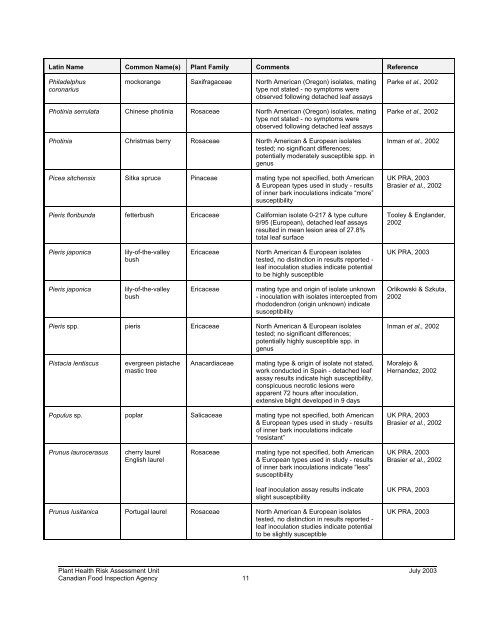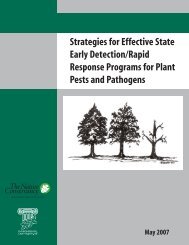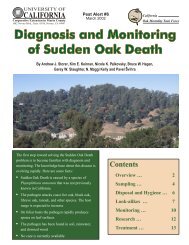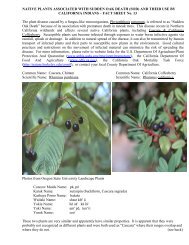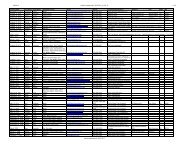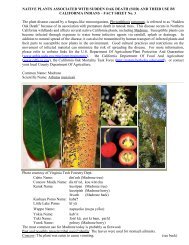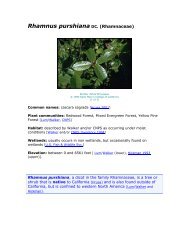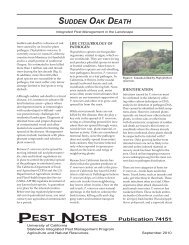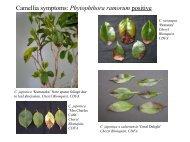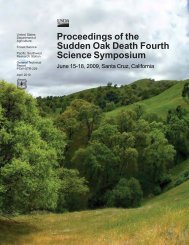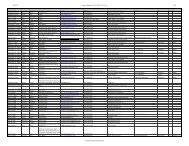Hosts of Phytophthora ramorum, CFIA, July, 2003 - Sudden Oak Death
Hosts of Phytophthora ramorum, CFIA, July, 2003 - Sudden Oak Death
Hosts of Phytophthora ramorum, CFIA, July, 2003 - Sudden Oak Death
You also want an ePaper? Increase the reach of your titles
YUMPU automatically turns print PDFs into web optimized ePapers that Google loves.
Latin Name Common Name(s) Plant Family Comments Reference<br />
Philadelphus<br />
coronarius<br />
mockorange Saxifragaceae North American (Oregon) isolates, mating<br />
type not stated - no symptoms were<br />
observed following detached leaf assays<br />
Parke et al., 2002<br />
Photinia serrulata Chinese photinia Rosaceae North American (Oregon) isolates, mating<br />
type not stated - no symptoms were<br />
observed following detached leaf assays<br />
Photinia Christmas berry Rosaceae North American & European isolates<br />
tested; no significant differences;<br />
potentially moderately susceptible spp. in<br />
genus<br />
Picea sitchensis Sitka spruce Pinaceae mating type not specified, both American<br />
& European types used in study - results<br />
<strong>of</strong> inner bark inoculations indicate “more”<br />
susceptibility<br />
Pieris floribunda fetterbush Ericaceae Californian isolate 0-217 & type culture<br />
9/95 (European), detached leaf assays<br />
resulted in mean lesion area <strong>of</strong> 27.8%<br />
total leaf surface<br />
Parke et al., 2002<br />
Inman et al., 2002<br />
UK PRA, <strong>2003</strong><br />
Brasier et al., 2002<br />
Tooley & Englander,<br />
2002<br />
Pieris japonica<br />
lily-<strong>of</strong>-the-valley<br />
bush<br />
Ericaceae<br />
North American & European isolates<br />
tested, no distinction in results reported -<br />
leaf inoculation studies indicate potential<br />
to be highly susceptible<br />
UK PRA, <strong>2003</strong><br />
Pieris japonica<br />
lily-<strong>of</strong>-the-valley<br />
bush<br />
Ericaceae<br />
mating type and origin <strong>of</strong> isolate unknown<br />
- inoculation with isolates intercepted from<br />
rhododendron (origin unknown) indicate<br />
susceptibility<br />
Orlikowski & Szkuta,<br />
2002<br />
Pieris spp. pieris Ericaceae North American & European isolates<br />
tested; no significant differences;<br />
potentially highly susceptible spp. in<br />
genus<br />
Inman et al., 2002<br />
Pistacia lentiscus<br />
evergreen pistache<br />
mastic tree<br />
Anacardiaceae<br />
mating type & origin <strong>of</strong> isolate not stated,<br />
work conducted in Spain - detached leaf<br />
assay results indicate high susceptibility,<br />
conspicuous necrotic lesions were<br />
apparent 72 hours after inoculation,<br />
extensive blight developed in 9 days<br />
Moralejo &<br />
Hernandez, 2002<br />
Populus sp. poplar Salicaceae mating type not specified, both American<br />
& European types used in study - results<br />
<strong>of</strong> inner bark inoculations indicate<br />
“resistant”<br />
UK PRA, <strong>2003</strong><br />
Brasier et al., 2002<br />
Prunus laurocerasus<br />
cherry laurel<br />
English laurel<br />
Rosaceae<br />
mating type not specified, both American<br />
& European types used in study - results<br />
<strong>of</strong> inner bark inoculations indicate “less”<br />
susceptibility<br />
UK PRA, <strong>2003</strong><br />
Brasier et al., 2002<br />
leaf inoculation assay results indicate<br />
slight susceptibility<br />
UK PRA, <strong>2003</strong><br />
Prunus lusitanica Portugal laurel Rosaceae North American & European isolates<br />
tested, no distinction in results reported -<br />
leaf inoculation studies indicate potential<br />
to be slightly susceptible<br />
UK PRA, <strong>2003</strong><br />
Plant Health Risk Assessment Unit <strong>July</strong> <strong>2003</strong><br />
Canadian Food Inspection Agency 11


